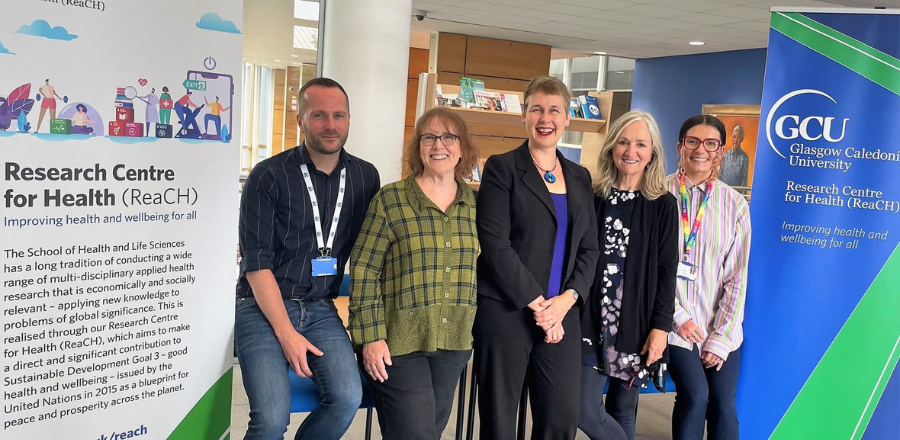New research project to help LGBTQ+ women challenge drinking social norms

Glasgow Caledonian University’s Research Centre for Health (ReaCH) has teamed up with experts from America to find new ways to help LGBTQ+ women reduce their alcohol intake.
Sober curiosity is a growing wellness movement that challenges the social norms around alcohol and encourages people to become more aware of their drinking behaviour.
The team from ReaCH Substance Use Research Group, led by Dr David Whiteley, along with the Centre’s Co-Director Professor Carol Emslie and PhD researcher Beth Meadows, will look at how sober curiosity could be useful for sexual minority lesbian, bisexual, trans and queer women.
Their US collaborators are Principal Investigator in the study, Professor Tonda Hughes, and Dr Lauren Bochicchio, both from the Columbia University in New York, and Professor Laurie Drabble, from San Jose State University in California. They are currently visiting Glasgow to spend time with the ReaCH team.
The year-long study is funded through a £15,500 grant from the Columbia University School of Nursing (Elaine Larson Global Development Fund). More than £7,000 will go to ReaCH to probe the Scottish angle.
Dr Whiteley said: “It’s fantastic to be working alongside our American colleagues, and to have them visit us here in Glasgow for the summer. Professors Hughes and Drabble are leading researchers in the field, so it’s a real privilege to partner with them on this international collaboration.
“When you look at alcohol-related harms, LGBTQ+ people are disproportionately affected across the board. Within that, lesbians, bisexual, trans and queer women seem to be at particular risk, so are really important groups to focus on. We hope this research will give us real insight that will help improve community health both here in Scotland, and further afield.
“Leveraging the sober curious movement is a new approach to helping people think about reducing their drinking. It’s about being mindful about drinking, rather than pledging you’ll be teetotal forever, and being more conscious about the way that alcohol affects you. It’s a very person-centred approach, giving people agency to make their own changes.”
Very little research has explored sexual minority women’s drinking norms and behaviours and the team will work with partners from the KinderStrongerBetter campaign, which highlights substance use in the LGBTQ+ community, to recruit people for their study and transform their findings into action to improve community health and wellbeing.
Dr Whiteley added: “This study will explore the attitudes and perspectives of sexual minority women in Scotland to help them reduce their alcohol intake, and consider whether a ‘sober curious’ approach could be effective.
“We want to get a better understanding of the drinking behaviours of sexual minority women in Scotland, and what factors influence those behaviours. We want to know what might impact their decisions to reduce alcohol consumption, and whether interventions that draw on the sober curious movement could be helpful.
“Ultimately, this study will lay the foundations for helping us tackle alcohol-related harms experienced by sexual minority women in Scotland.”
Photo shows Dr David Whiteley, Professor Laurie Drabble, Professor Carol Emslie, Professor Tonda Hughes and Beth Meadows together at the Glasgow campus.
